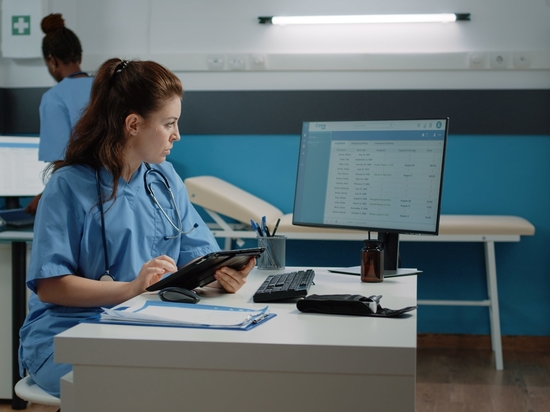
#Industry News
How to Find the Perfect Computer for Medical Coding and Billing
Importance of Unsung Medical Office Heroes and their PCs
Medical coders and billers are unsung heroes in healthcare. They ensure providers' diagnostic and procedural notes are translated into the correct codes tracking patient health and to receive payments from insurance companies.
Today's article offers a brief overview of both occupations, their functions, and how they relate to one another. We then cover the major reasons why medical computers are essential for these relatively unknown – yet vital – health office workers.
Basic Code: What is Medical Coding and Billing?
In expansive healthcare organizations, it’s common to find distinct departments dedicated to medical coding and billing, each staffed by specialized professionals. However, recognizing the intricate relationship between these two critical functions, many of these groups often seek to employ individuals who possess expertise in both areas. This dual proficiency allows for a seamless flow of information and enhances the overall efficiency of the healthcare revenue cycle.
As their name implies, medical coders or coders perform medical coding. They spend their shift reviewing providers' notes like electronic medical records and looking for items like disease names, medical conditions, and even instruments used. Each item is assigned a standard code drawn from sources such as Current Procedural Terminology, International Classification of Diseases, and Healthcare Common Procedure Coding System.
Unsurprisingly, medical billers do medical billing. They review the codes from coders to generate billing claims for insurance companies. Billers must submit the correct codes, as companies deny payment requests due to errors. Billers are also responsible for investigating these denials and getting payment from patients for anything not covered by insurance.
Four Reasons Why Medical PC is Best for Coding and Billing
Medical coders and billers work under typical office conditions, spending long hours in front of a computer screen dealing with many electronic – and even paper – files. They shouldn't be working with off-the-shelf PCs typical in such places, though. Instead, they should be equipped with medical computers for the following four reasons.
Reliability
Medical coders and billers use specialized software or applications to perform their numerous duties. Their PCs must be reliable, as slowdowns and computer crashes could affect hours of highly precise work.
These medical computers are meticulously engineered from the foundation up, prioritizing unparalleled reliability and performance. Each system is crafted with precision, ensuring that the technological backbone of patient care stands resilient and steadfast in the face of urgency.
Some of the features to look out for in highly reliable PCs include:
Fanless cooling design and solid-state drive: Both have no moving parts that could wear down and break, shutting down the PC entirely. Also, they're silent during operation and won't interpret the employee's concentration.
IP65 front bezel: The screen is sealed against dust and fluid, protecting the PC's interior from accidental spray by the cleaning crew or spilled coffee during employee breaks.
Low Computer Fail Rate: Reputable Original Equipment and Design Manufacturers further ensure their computers' reliability by ensuring they have as low a fail rate as possible.
Lots of processing power: Coders and billers' specialized software and applications can demand lots of processing power. PCs should come with Intel i5 or i7 processors to handle the workload.
Safe Screen
Medical coders and billers often spend long hours in front of their computer monitors, which can lead to computer vision syndrome or digital eye strain. This condition may result from inadequate brightness or resolution from standard PCs and monitors. To help prevent such eye problems, medical-grade computers and monitors are designed for bright environments, like operating rooms. Additionally, coders and billers dealing with screen glare from indoor lighting or sunlight can protect their eyesight by using an anti-glare screen.
Eyes
Regarding protection, coders and billers work daily with highly sensitive patient data. Privacy filters can protect it by obscuring screen views from any angle except directly.
Ergonomics for Well-Being
Medical coders and billers often find themselves immersed for hours in the glow of their computer screens, a routine that can lead to a troubling condition known as computer vision syndrome or digital eye strain. This affliction arises from the combination of inadequate brightness and subpar resolution typical of standard monitors, causing fatigue and discomfort. To combat these issues, specially designed medical-grade computers and monitors shine brightly, tailored to the intense light conditions of environments like operating rooms. Specifically, these PCs are equipped with the simple yet effective solution of anti-glare screens. These protective barriers not only shield their eyes from discomfort but also create a more focused and clear viewing experience, ensuring that their vision remains sharp and effective.
It's essential to safeguard one’s eyesight, especially in a profession where precision and accuracy are paramount. Additionally, privacy remains a critical concern, protecting sensitive information from prying, unauthorized eyes.
Make Medical Coding and Billing Easy Through Cybernet PCs
Medical coding and billing play important roles in healthcare. Computers must be built from the ground up to handle the demanding work and sometimes harsh hospital environments. Essential features of PCs used in this field include reliability, screens, and ergonomic design.
Contact the team at Cybernet Manufacturing if you are looking for suitable computers for your medical coding and billing departments. Team members will happily discuss the numerous features of our All-in-One medical panel PCs and business computers and why they’re superior to off-the-shelf brands.







